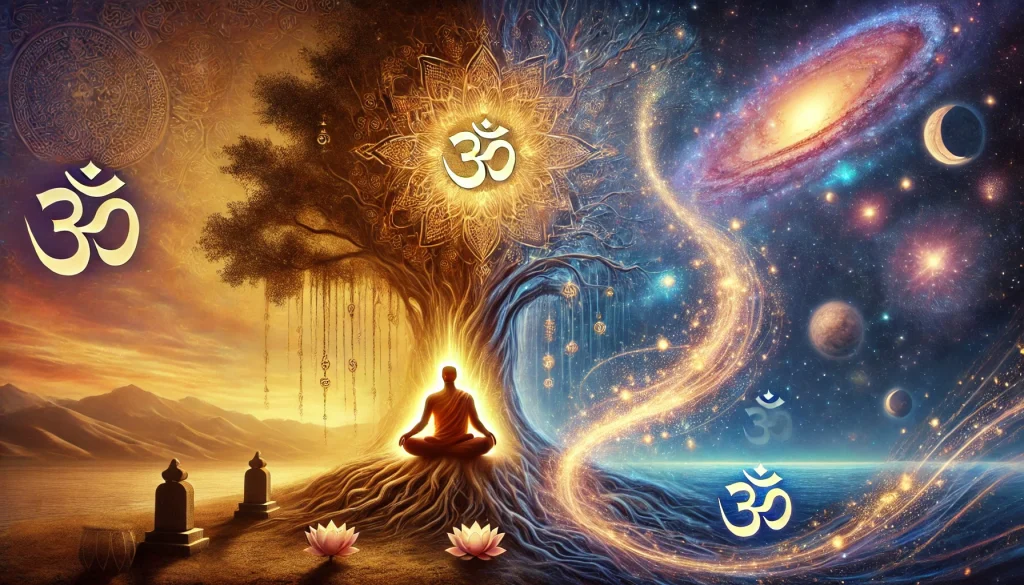Moksha: The Ultimate Freedom in Hindu Philosophy
In Hindu philosophy, the concept of freedom—known as Moksha—is not merely about escaping the cycle of life and death (Samsara), but about realizing the fundamental truth of existence. It is the ultimate liberation, the awakening to the unity of the self (Atman) with the cosmic consciousness (Brahman). This state of enlightenment is the highest goal of human life, transcending material pursuits and temporary pleasures. Moksha is not just an endpoint; it is the culmination of wisdom, self-discipline, and spiritual evolution.
Understanding the Nature of Moksha
Moksha is the state of absolute freedom where one sheds ignorance (Avidya), overcomes attachments, and transcends the limitations of the ego. Unlike Western notions of freedom that emphasize personal autonomy and external liberties, Moksha is about inner liberation. It is the freedom from the cycle of birth and rebirth (Samsara), which is driven by karma—the law of cause and effect that binds individuals to the material world.
At its core, Moksha is about realizing the eternal, unchanging nature of the self. The Upanishads and other Hindu scriptures teach that the Atman (individual soul) is not separate from Brahman (the supreme reality). However, due to ignorance, people falsely identify with their transient physical bodies and worldly identities, leading to suffering and illusion (Maya). Through deep spiritual practice, one can pierce this illusion and experience the blissful oneness of existence.
The Path to Liberation
Hindu philosophy offers multiple paths to attain Moksha, recognizing that different individuals resonate with different approaches based on their temperament and life circumstances. These paths include:
- Jnana Yoga (Path of Knowledge): This is the intellectual approach to liberation, where seekers engage in deep inquiry, contemplation, and self-reflection. By distinguishing between the real (Brahman) and the unreal (Maya), they dissolve ignorance and realize their true nature.
- Bhakti Yoga (Path of Devotion): This is the path of love and surrender to a personal deity, where the devotee cultivates a deep emotional and spiritual connection with the Divine. Through devotion, one transcends the ego and merges with the object of their worship, attaining liberation.
- Karma Yoga (Path of Action): This path teaches individuals to perform selfless actions without attachment to the fruits of their labor. By dedicating all actions to the Divine and relinquishing personal desires, one purifies the mind and attains freedom.
- Raja Yoga (Path of Meditation and Discipline): Also known as the eightfold path of Patanjali’s Yoga Sutras, this method involves ethical discipline, physical postures, breath control, concentration, and meditation to reach the ultimate state of self-realization.
Each of these paths, though distinct, ultimately leads to the same realization: the dissolution of the ego and the experience of unity with the Divine.
Living in Liberation
Moksha is often misunderstood as something that can only be attained after death. However, Hindu philosophy teaches that liberation can be experienced while living (Jivanmukti). A Jivanmukta, or liberated being, continues to exist in the physical world but remains untouched by its illusions. They act without selfish motives, experience deep peace, and radiate wisdom and compassion.
The Bhagavad Gita emphasizes that true freedom is not the rejection of life but the ability to engage with it fully, without attachment or suffering. A person who attains Moksha while alive is free from the bondage of karma, experiencing an unshakable state of joy and contentment regardless of external circumstances.
The Timeless Relevance of Moksha
In a world driven by materialism and fleeting desires, the pursuit of Moksha serves as a reminder of a deeper purpose. It encourages introspection, self-discipline, and detachment from superficial pleasures in favor of eternal bliss. While modern life may present distractions, the teachings of Hindu philosophy offer timeless wisdom for those seeking genuine freedom—not in escaping reality, but in understanding its highest truth.
Moksha is not about renouncing life but about living with full awareness and realizing the divine essence within and around us. It is the ultimate journey of the soul, where one moves from illusion to enlightenment, from bondage to freedom, and from separation to oneness with the eternal.
